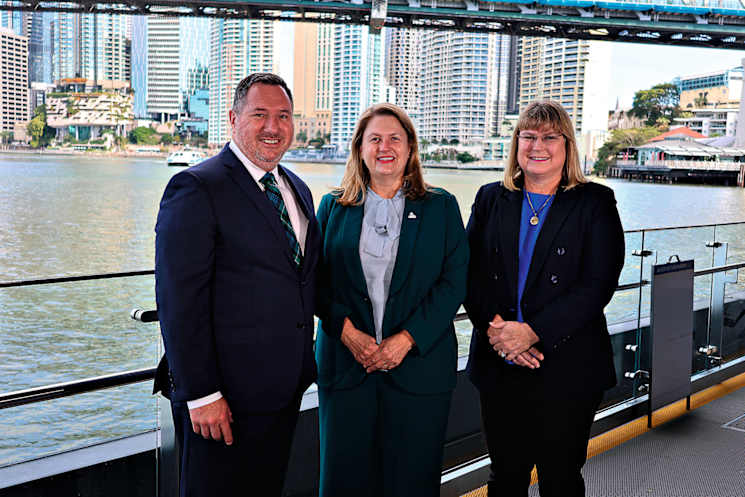
Mayor Teresa Harding (centre) at the launch of the $30 million SEQ Resilient Rivers program launch with Minister for the Environment, Tourism, Science and Innovation Andrew Powell and Minister for Fire, Disaster Recovery and Volunteers Ann Leahy.
Black Snake Creek upgrade, endangered species hotspots profiled, cod hotels installed
WATERWAYS and habitats in the greater Ipswich region will gain wide-ranging benefits from the newly announced $30 million in funding for a two-year, Resilient Rivers program.
More than 30 projects throughout South East Queensland will be funded through the program.
While a number of the SEQ-wide projects will encompass the greater Ipswich area, one of the projects specifically targets Black Snake Creek and involves improving riverbank vegetation and water quality.
“Black Snake Creek, though a small waterway, is a very influential tributary when it comes to Greater Brisbane’s drinking water as it flows from Ipswich to Somerset and enters the Brisbane River just above the Mount Crosby treatment plant,” said Ipswich Mayor Teresa Harding.
“The water flows from the treatment plant into the taps of thousands across the Greater Brisbane area.
“All our water is linked and the impacts in one small place can influence many people, places, plants and animals downstream.
“With this in mind, Ipswich City Council, with the support of SEQ Council of Mayors, has invested $450,000 over the past eight years planting more than 25,000 trees in the upper catchment to help address issues of water quality resulting from 200 years of clearing and land management practises.”
Cr Harding praised the strategic outlook of the latest Resilient Rivers program.
“The benefit is that it is a region-wide management approach, which recognises that issues upstream are equally relevant to those downstream.
“This is the only way that waterways in their entirety can be improved.
“Both Somerset and Ipswich will benefit from the additional funding that will see revegetation along the creek and floodplain to reduce the salinity in the Black Snake Creek catchment.
“Likewise, the Bremer River and Warrill Creek will benefit from collaboration with the community living along those waterways, as councils work with landholders to deliver restoration projects.”.
Another project which will directly benefit the greater Ipswich area is the first regionally co-ordinated environmental DNA (eDNA) survey.
This will involve the collection of water samples from selected sites across South East Queensland during the two year period. The samples will be tested for DNA markers of vertebrates and invertebrates and the data collected will help identify aquatic biodiversity hotspots.
“The survey will detect threatened species such as platypus, freshwater turtles and endangered lungfish, gathering vital data to guide future conservation work,” Cr Harding said.
Native species plantings in the catchments will form part of a number of the projects.
“More than 200,000 new natives will be planted across 116 hectares to support vital habitat for local wildlife including koalas, glossy black cockatoos, squirrel gliders and platypus.”
More than 200 cod hotels, underwater log structures which provide shelter and breeding habitat for the Mary River cod, will be constructed and installed in the Somerset region.
Cr Harding said the population of the critically endangered cod would also be bulked up with the release of 30,000 fingerlings and 40km of passages would also be restored to create habitat for native fish species.
“Our waterways are under increased pressure from population growth and natural disasters and the [Resilient Rivers] program will deliver real results in disaster recovery and enhanced flood resilience by increasing vegetation, reducing erosion and preventing more than 16,000 tonnes of sediment from entering waterways.”
The $30 million in funding for the projects comes from $21.3 million already committed by the State and Australian governments through the SEQ City Deal and $8.7 million from partners including SEQ councils and Seqwater.





